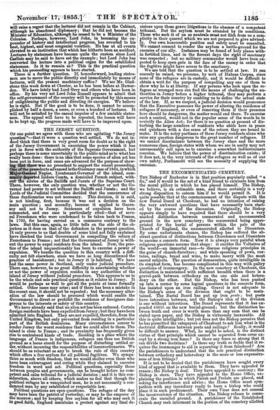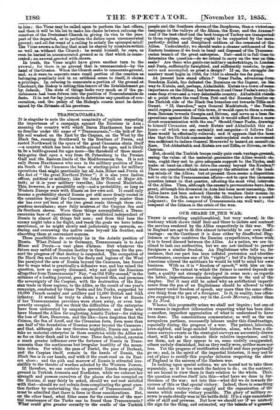THE EXCOMMUNICATED CEMETERY.
TIrE Bishop of Rochester is in that position popularly called " a fix," and it would be the act of a kind friend to extricate him from the moral pillory in which he has placed himself. The Bishop, we believe, is an estimable man, and there certainly is a very strong disposition to esteem him if he would permit it. It is quite possible that at the commencement of the dispute with the new Burial Board at Cheshunt, he had no intention of raising the very awkward questions that have necessarily been start- ed by the course of the discussion. Originally, the Bishop appears simply to have required that there should be a very marked distinction between consecrated and unconsecrated ground in the new cemetery ; the consecrated being appro- priated for the burial of persons within the pale of the Church of England, the unconsecrated allotted to Dissenters. By some unfortunate chance, the Bishop has suffered the ab- stract question of distinctions between Churchmen and Dissenters to assume a concrete form. Now it is always very painful when religious questions assume that shape : it enables the Voltaires of the world—an immortal race—to discuss religious principles in the guise of church-furniture ; and while speaking of pews, cur- tains, railings, bread and wine, to make merry with the most sacred subjects. The question of demarcation, quite intelligible in its simplest form, has become complicated in this way with paltry questions of ironmongery. In the new cemetery at Cheshunt, the distinction is maintained with sufficient breadth when there is a gravel-path between orthodoxy on the one side and hetero- doxy on the other. But the Bishop, who has been pushed up into a corner by some logical questions in the concrete form, has insisted upon an iron railing. Gravel is not adequate to the Bishop's sense of the division that ought to be main- tained. The Burial Board has put up iron poses ; but posts have interstices between, and the Bishop's idea of the division is one without interstices. The Board represents that it has ex- pended 45611. on the new burial-ground ; but the distinction be- tween truth and error is worth more than any sum that can be stated upon paper, and the Bishop is virtuously inexorable. All this is quite intelligible ; but yet does not the Bishop perceive that he has permitted the ratepayers of Cheshunt to ask him what is the doctrinal difference between posts and railings ? Really, it would be difficult to answer. What, he might be asked, is the distinct virtue of that principle which cannot be separated from error ex- cept by a strong iron fence ? Is there any fence so strong that it can divide two doctrines ? Is there any truth so feeble that it re- quires the ironmonger to aid in separating it from falsehood ? Are the parishioners to understand that the sole practical distinction between orthodoxy and heterodoxy is the more or less expensive- ness of iron fittings ?
It is not to be denied that the parishioners have sought every kind of appeal that is available to them. They have appealed to reason ; the Bishop is deaf. They have appealed to economy ; the Bishop is stern. They have appealed to the Homo Office, ex- plaining the position in which Parish and Prelate are placed, and asking for interference and advice ; the Home Office must sym- pathize with any incendiary ready to burn a bishop who could place it in such predicament. Their own Vicar does not conceal
the inconvenience of the situation. The Bishop refuses to conse- crate the unrailed ground. A parishioner of the Established Church may seek interment in the portion of the cemetery allotted to him ;.-. thaTiearntay be-called upon- to -perform the last: offieete and theadt, will be his lot.to make his. choice between sanction ofrtheProtestant- Church in. giving. its-visa. to the pass- port of:the departed, or-to perform the duties .n a,.. unconsecrated: ground; and,alliforwant of a railing to satisfy t episoopalmindi The Vicar avows:a:feeling:that:must be shared by numberkwithin. as. well ea., without the Church; he would . himself; he says, as soon .be.bariul inanconseerated ground:as in that which is conse-
crated; :an avowal with-cheers:
Its truth, the Vicar: might have given another turn to the avowal ; for there . is: no ground that- unconsecrated—by the hand of theCreator. When:the Church seeks to consecrate ground, and, as -it. were to separate somesmall, portion of the-creation as belonging.peetdiarly and ht. an artificial. sense to itself; it claims atprivilege. ID.- reftaing.to consecrate &portion of- the ground.at. Cheshunt; the Bishop is lettingthis: tenure of the Establishment go, by default. The state of things looks-very much. as- if the- pa,-- rishioners.. had been driven into the position of Nonconformiattide facto. It is-, not for lay, journals- to determine any question:of-eon. - secmtion, and: the policy of the Bish4s- course must .he: detere min.edby: the Jariteeta.c•L his saw



































 Previous page
Previous page